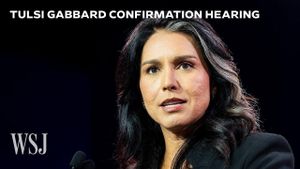Two top security officials within the U.S. Agency for International Development (USAID) have been placed on administrative leave following their refusal to allow access to classified materials as requested by Elon Musk's newly established Department of Government Efficiency (DOGE). The confrontation highlights the tension between federal agencies and the aggressive measures taken by Musk to streamline government operations.
The officials, John Vorhees, USAID's Director of Security, and his deputy, Brian McGill, were acting on their legal obligations to safeguard sensitive information against unauthorized access. According to multiple reports, including one from the Associated Press, the DOGE teams lacked the necessary security clearance to enter restricted areas of the agency. The request for access was made over the weekend, and the eventual denial led to Musk's public denunciation of USAID as, "a criminal organization. Time for it to die."
The situation escalated as members of DOGE managed to gain entry to certain classified materials at USAID, which reportedly included intelligence reports. This incident mirrors earlier events at the Treasury Department, where DOGE was granted access to sensitive financial systems without proper clearance protocols being strictly upheld.
Musk formed DOGE with the intention of identifying waste and fraud within the federal government. The department’s mandate has positioned it as both a cost-cutting measure and a tool for reorganization, appealing to the Trump administration’s policy goals. Reports indicate DOGE's operations have already resulted in significant cuts, allegedly saving taxpayers approximately $1 billion per day by halting unnecessary hiring practices.
This leads to concerns raised by lawmakers about the potential consequences of giving Musk substantial control over sensitive government functions. U.S. Senator Ron Wyden expressed criticism over Musk gaining dominance over the Treasury's federal payment systems, citing the risk it imposes on the economy and citizens dependent on government assistance.
Critically, USAID's future has come under scrutiny following these events. Amid the chaos, reports surfaced indicating the agency's website had gone offline abruptly, redirecting users to the White House webpage at one point, adding another layer of uncertainty surrounding its operations. Political insiders suggest there may be government plans to subsume USAID under the State Department, which would legally require Congressional approval and could lead to pushbacks from Senate leaders who cite the importance of retaining USAID's independent oversight.
While USAID has been one of the entities targeted by this administration's scrutiny, it remains the world’s largest humanitarian aid agency, managing programs across more than 100 countries. President Trump’s administration has already implemented freezes on foreign aid and made changes to the leadership and staff structure at the agency, which has led to widespread concern among aid organizations about their operations and the resources available to those affected by disasters and poverty worldwide.
Further complicate matters, Musk’s administration appears to be favoring aggressive actions devoid of long-standing procedural norms, evidenced by reports of threatening to involve federal marshals for access to specific locations within the USAID premises. These tactics evoke concerns about potential overreach, especially as agency employees were feeling pressured to comply with the demands being levied by the new administration.
Adding to the controversy, it has been reported by various media outlets and former officials at USAID about Musk’s broader plans for the federal workforce, which include plans to reduce headcounts and cut programs drastically. Critics argue this approach could cripple established governmental functions aimed at serving the public interest, especially as many of the agency’s operations hinge on lengthy projects built to address socioeconomic issues globally.
The ramifications of these actions may be felt far and wide, particularly for nations reliant on U.S. support. The significance of established agencies like USAID cannot be understated, as their framework enables the U.S. to provide humanitarian assistance, promote democracy, and counter global threats.
Looking forward, as the political discourse continues around the control of such agencies and Musk's influence grows within governmental spheres, there is mounting pressure on the administration to clarify its intentions. Lawmakers are demanding answers as the uncertainty surrounding the agency's future and its immediate capabilities loom large.
The standoff between Musk's DOGE and USAID security serves as a bellwether for the broader ideological struggle within the U.S. government—a clash over the future of governance amid calls for efficiency with the perpetual need for oversight and established protocol. Such tensions could reshape the entire operational foundation of how government agencies, particularly those dedicated to humanitarian work, function.



